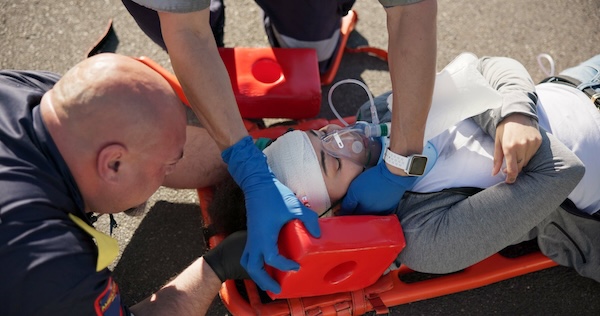The Critical Link Between Car Accidents and Traumatic Brain Injuries
Car accidents are among the leading causes of traumatic brain injuries (TBI), which can range from mild concussions to severe head trauma that can leave lasting physical, emotional, and cognitive effects. Traumatic brain injuries can occur in a split second, often with little warning, and their consequences can affect a person’s life forever.
If you’ve been involved in a car accident and are facing the aftermath of a TBI, it’s crucial to consult experienced North Carolina car accident lawyers who can help you understand your rights, seek compensation, and navigate your path to recovery. In this blog, we’ll explore how TBIs occur in car accidents and the serious consequences that follow, shedding light on the severity and long-term impact of these injuries.
What is a Traumatic Brain Injury (TBI)?
A traumatic brain injury (TBI) refers to damage to the brain caused by an external force, such as a blow to the head, a sudden jolt, or an object penetrating the skull. TBIs can vary significantly in severity, from mild cases like mild traumatic brain injury (mTBI), commonly known as a concussion, to moderate to severe TBIs that result in significant, life-altering consequences.
- Mild traumatic brain injury (mTBI): This is typically a concussion, a type of brain injury that causes temporary symptoms such as headaches, dizziness, nausea, and confusion. While the effects of mTBI are often short-lived, they can still disrupt a person’s daily life.
- Moderate to severe TBI: These injuries often result in longer-lasting effects. Symptoms can include prolonged loss of consciousness, cognitive difficulties, seizures, and even coma. In the most severe cases, severe traumatic brain injury can lead to permanent brain damage or brain death.
- Severe traumatic brain injury (TBI): This is the most serious type of brain injury, often resulting from high-impact accidents or major trauma. Severe TBIs can lead to extensive brain tissue damage, loss of cognitive abilities, motor function impairment, and in extreme cases, death.
How Car Accidents Cause Traumatic Brain Injuries
Car accidents are one of the leading causes of traumatic brain injuries, and the mechanism behind these injuries can be multifaceted. Motor vehicle crashes subject the body to intense forces that the human body isn’t built to withstand, especially in terms of rapid acceleration and deceleration. The resulting external force on the head and neck can lead to a variety of injuries.
- Whiplash: In rear-end collisions, the neck and head can snap forward and backward quickly, causing damage to the brain even without direct impact. This can lead to diffuse axonal injury, which occurs when the brain’s long connecting fibers, or axons, are stretched and torn. This can result in severe brain dysfunction.
- Head Impact: If the head strikes a hard surface, such as the dashboard, steering wheel, or window, it can result in brain trauma. This type of injury often leads to contusions, bleeding, or skull fractures, which can have long-lasting effects on the nervous system.
- Penetrating TBI: In some rare but extreme cases, sharp objects or debris from the crash can penetrate the skull, causing a penetrating TBI. These types of injuries can cause severe damage to brain cells, leading to permanent brain damage.
- Closed Head Injury: This is the most common type of TBI in car accidents. Although there is no penetration of the skull, the brain still sustains damage due to the sudden movement or force exerted during the crash. This type of injury can lead to bruising of the brain, swelling, and bleeding, which can disrupt normal brain function.
The Severity of Traumatic Brain Injuries in Car Accidents
The severity of a traumatic brain injury largely depends on the force of the impact, the location of the injury, and the duration of the injury. Understanding the severity of TBIs is essential for medical professionals to assess the long-term effects on the patient and determine appropriate treatment options.
- Mild TBI: Most individuals who experience mild TBIs recover within a few weeks to months. However, some may experience persistent symptoms, including chronic headaches, dizziness, and memory problems. Chronic traumatic encephalopathy (CTE), a degenerative brain disease, is also a potential long-term complication of repeated mild TBIs.
- Moderate TBI: Symptoms from moderate TBIs are more severe and may include confusion, loss of consciousness, and impaired motor function. Recovery may take longer, and people with moderate TBIs often experience behavioral or mood changes. Long-term symptoms can affect a person’s ability to work or perform daily activities.
- Severe TBI: Severe traumatic brain injuries are life-threatening and often require immediate medical intervention. In addition to physical impairments such as paralysis, speech difficulties, and memory loss, severe TBIs can cause emotional symptoms, including depression and anxiety. Recovery can be slow, and some individuals may never regain full functionality. In the most severe cases, a brain death diagnosis may be made if the brain ceases to function completely.
Symptoms of Traumatic Brain Injuries After a Car Accident
The symptoms of a traumatic brain injury can vary depending on the severity of the injury and the area of the brain affected. Common symptoms of TBI include:
- Mild TBI Symptoms: Headaches, dizziness, nausea, blurred vision, light sensitivity, and mild confusion. These symptoms typically resolve in a short period of time, but some individuals may experience post-concussion syndrome, which can cause persistent issues like fatigue, mood swings, and difficulty concentrating.
- Moderate TBI Symptoms: A person may experience prolonged loss of consciousness, confusion, and amnesia. Symptoms can include severe headaches, nausea, cognitive difficulties, and motor impairments. Behavioral changes, such as aggression or mood swings, may also occur.
- Severe TBI Symptoms: This can include significant cognitive and emotional disturbances, including the inability to speak, paralysis, and severe injuries that result in long-term disability. Severe TBIs can lead to permanent brain damage and even brain death if not treated promptly.
Early diagnosis and treatment are critical to preventing worsening symptoms. Physical therapy, cognitive rehabilitation, and emotional support are often necessary for individuals with moderate to severe TBIs to help them regain function and adjust to life post-injury.
The Impact of Traumatic Brain Injury on Health and Life
A traumatic brain injury (TBI) affects much more than just the brain; it can lead to a range of health issues that impact an individual’s overall well-being. Even mild brain damage can disrupt motor function, speech, memory, and daily tasks. Whether from a concussion, moderate, or severe TBI, these injuries often require extensive medical intervention and long-term rehabilitation. The effects can be physical, cognitive, emotional, and behavioral, often leading to challenges that last far beyond the initial injury.
Cognitive Impairments Caused by Traumatic Brain Injuries
Cognitive difficulties are a common consequence of moderate to severe TBIs, affecting memory, concentration, and decision-making. Even those with mild TBIs, such as concussions, can experience symptoms like difficulty concentrating and short-term memory loss. As the severity of the injury increases, individuals may struggle with more complex cognitive tasks, including problem-solving and processing information. Executive functioning—the brain’s ability to manage tasks such as planning and organizing—can also be severely impacted. In cases of severe TBI, these issues may interfere with a person’s ability to work, communicate, and function independently.
Emotional and Behavioral Symptoms Following a TBI
Along with cognitive impairments, emotional and behavioral symptoms are often seen in individuals with TBIs. Damage to the brain’s limbic system, which controls emotions, can result in mood swings, anxiety, and depression. Even those with mild injuries might experience irritability or increased frustration. For individuals with moderate to severe TBIs, impulsivity and aggression are common, making it difficult to maintain relationships and hold down a job. Behavioral changes can be sudden and unpredictable, and managing these symptoms often requires therapy, medication, and ongoing emotional support.
Physical Limitations: Restoring Motor Function and Independence
Physical impairments are also a hallmark of traumatic brain injuries. Individuals with moderate to severe TBIs often face difficulties with motor function, such as walking, speaking, and performing everyday tasks. Severe injuries can lead to paralysis or other long-term physical limitations. Physical therapy is a key part of the recovery process, helping individuals regain strength, coordination, and mobility. Speech therapy may also be necessary for those who experience difficulty with communication. While the extent of recovery depends on the injury’s severity, many individuals can regain some of their lost abilities over time with consistent therapy and rehabilitation.
Chronic Conditions Linked to Severe Traumatic Brain Injury
In severe cases, individuals may develop chronic conditions such as chronic traumatic encephalopathy (CTE). This neurodegenerative disease, often associated with repeated head trauma, causes progressive cognitive decline, mood swings, and memory problems. CTE is most commonly seen in athletes but can affect anyone who has sustained multiple TBIs over their lifetime. Severe TBIs also increase the risk of developing Parkinson’s disease, Alzheimer’s disease, and other neurodegenerative disorders. Moreover, individuals who experience severe TBIs may also face lifelong challenges like chronic pain, seizure disorders, and sleep disturbances, all of which may require ongoing management.
The Importance of Early Intervention and Comprehensive Care
Early diagnosis and treatment are critical for minimizing long-term damage and improving recovery outcomes. For individuals with traumatic brain injuries, addressing physical, emotional, and cognitive needs through rehabilitation, therapy, and medical intervention is vital. The road to recovery may be long, but with proper care, many individuals can regain functionality and improve their quality of life.
Whether recovering from a mild traumatic brain injury or dealing with the consequences of a severe TBI, the journey is unique for each individual. Early intervention and comprehensive care, including physical, cognitive, and emotional support, are essential for helping individuals regain independence and live fulfilling lives despite the challenges caused by their injuries.
Risk Factors and Prevention of Traumatic Brain Injuries in Car Accidents
While it’s impossible to prevent every car accident, there are steps you can take to minimize the risk of traumatic brain injury in the event of a collision. Some risk factors to consider include:
- Seatbelts: Wearing a seatbelt is the most effective way to reduce the risk of TBI in a car accident. A seatbelt helps to secure your body and prevent sudden movements that could cause your head to impact the dashboard or steering wheel.
- Vehicle Safety Features: Modern vehicles come equipped with advanced safety features, such as airbags and crumple zones, which help to reduce the force of an impact and protect the head and neck during a collision.
- Helmets: In certain high-risk activities, like playing sports, wearing protective gear such as helmets can significantly reduce the likelihood of a TBI.
- Speed Limits and Driving Behaviors: Avoiding reckless driving, adhering to speed limits, and practicing safe driving can help prevent car accidents that lead to TBIs.
Diagnosis and Treatment of Traumatic Brain Injuries from Car Accidents
After a car accident, it’s essential to seek immediate medical attention to assess the severity of any potential head injuries. Medical professionals may use a combination of blood tests, CT scans, and MRIs to diagnose the presence and extent of a TBI.
- Physical and cognitive assessments: In addition to imaging tests, doctors may conduct physical and cognitive tests to evaluate brain function and detect any impairments.
- Treatment options: Treatment will vary depending on the severity of the injury. Mild TBIs may require rest and monitoring, while moderate to severe TBIs may require surgery, intensive care, and rehabilitation therapies such as cognitive rehabilitation and physical therapy.
Frequently Asked Questions About Traumatic Brain Injuries (TBI)
What is a traumatic brain injury (TBI) and how does it occur?
A traumatic brain injury (TBI) occurs when an external force causes damage to the brain. This can result from various incidents, including motor vehicle accidents, falls, sports injuries, or even physical assaults. The force may cause a concussion, contusion, brain tissue damage, or even brain death in extreme cases. The severity of a TBI can range from mild to severe, with symptoms varying depending on the extent of the injury. In the context of car accidents, a sudden impact or whiplash can lead to closed head injuries, where the brain is shaken within the skull, causing damage to brain cells and the nervous system.
What are the common symptoms of a mild traumatic brain injury (mTBI)?
Symptoms of a mild traumatic brain injury (mTBI), commonly referred to as a concussion, can include headaches, dizziness, nausea, fatigue, and confusion. In many cases, people with mild TBIs may experience behavioral or mood changes, such as irritability or depression. The symptoms often improve within a few days or weeks, but some individuals may experience long-lasting effects, including sleep patterns disruption or cognitive difficulties. It’s important to seek medical advice if you suspect a mild TBI, as early diagnosis can help prevent long-term consequences.
What is the difference between a mild, moderate, and severe traumatic brain injury?
The severity of a traumatic brain injury largely depends on the extent of brain damage caused by the impact. A mild TBI typically involves temporary symptoms such as confusion or a headache, while moderate TBIs may cause prolonged loss of consciousness and persistent cognitive difficulties. Severe TBI is the most serious form, often resulting from high-impact crashes or major trauma. In severe cases, the person may experience brain bleeding, brain death, or permanent motor function impairments. Understanding the severity is crucial for determining appropriate treatment and rehabilitation.
How can traumatic brain injuries impact cognitive and emotional function?
Traumatic brain injuries can have profound effects on both cognitive and emotional functions. Even in cases of mild TBI, individuals may experience memory loss, cognitive difficulties, and problems with concentration. Moderate to severe TBIs can lead to significant impairments in executive functioning, such as planning, decision-making, and problem-solving. Emotionally, TBI patients often face mood swings, anxiety, and depression. Long-term effects can include chronic traumatic encephalopathy (CTE), a degenerative condition that can lead to cognitive decline, behavioral changes, and even dementia.
What is a diffuse axonal injury and how does it relate to TBIs?
A diffuse axonal injury (DAI) is one of the most common and severe types of brain injury resulting from high-impact accidents, such as car crashes. It occurs when the brain is subjected to rapid acceleration or deceleration, causing the brain’s axons (the fibers that connect brain cells) to stretch or tear. This damage can disrupt communication between the brain’s cells, leading to long-term neurological impairment. DAI is often seen in moderate to severe TBI cases and is typically diagnosed through advanced imaging techniques like CT scans or MRIs.
Can a traumatic brain injury lead to long-term health problems?
Yes, traumatic brain injuries can lead to long-term health issues that significantly impact an individual’s quality of life. Even mild TBIs can result in persistent symptoms such as headaches, dizziness, and fatigue, while more severe injuries may cause permanent brain damage, memory loss, speech difficulties, and motor function impairments. In addition to cognitive difficulties, individuals may face emotional symptoms such as depression, anxiety, and aggression. Over time, repeated head injuries can increase the risk of chronic traumatic encephalopathy (CTE), a serious degenerative brain disease.
What treatment options are available for traumatic brain injuries?
Treatment for traumatic brain injuries varies based on the severity of the injury. For mild TBIs, doctors often recommend rest and monitoring to ensure that symptoms do not worsen. For moderate to severe TBIs, treatment may involve surgery, rehabilitation, and ongoing medical care. Cognitive rehabilitation, physical therapy, and speech therapy are common components of treatment for more severe cases. In extreme cases, when brain death occurs or when a severe head injury is sustained, doctors may focus on palliative care or end-of-life decisions.
How can traumatic brain injuries be prevented?
Preventing traumatic brain injuries involves taking proactive steps to reduce the risk of accidents and head trauma. In car accidents, wearing a seatbelt and using airbags can significantly reduce the risk of brain damage. Additionally, wearing protective gear like helmets can help prevent head injuries in activities like sports or motorcycle riding. Ensuring that vehicles are equipped with modern safety features, such as anti-lock braking systems and crumple zones, can also help mitigate the impact of accidents. Practicing safe driving and following traffic regulations further lowers the risk of sustaining a TBI in a car crash.
How is traumatic brain injury diagnosed?
Diagnosing a traumatic brain injury typically involves a combination of medical history review, physical exams, and diagnostic imaging. Doctors often use CT scans and MRI scans to detect brain tissue damage, bleeding, or swelling caused by the injury. In some cases, doctors may also perform blood tests to assess potential brain injury markers. For individuals with suspected mild TBI, cognitive tests and neurological assessments may be used to evaluate symptoms like memory loss or difficulty concentrating. Early detection is critical for minimizing the long-term effects of brain trauma.
Can traumatic brain injuries be treated with medication?
While there is no specific medication that can cure a traumatic brain injury, doctors may prescribe medications to manage symptoms and reduce complications. For example, pain medications can be used to treat headaches or neck pain, while antidepressants or antianxiety medications can help manage emotional symptoms like depression or anxiety. In some cases, doctors may prescribe anti-seizure medications if seizures are a risk following a moderate to severe TBI. The goal of medication is to address specific symptoms and improve quality of life during the recovery process.
What role does rehabilitation play in recovery from a TBI?
Rehabilitation is a vital part of the recovery process for individuals who have experienced a traumatic brain injury. Depending on the severity of the injury, physical therapy, speech therapy, and cognitive rehabilitation may be necessary to help restore lost functions. For individuals with moderate to severe TBIs, therapy can help regain motor skills, improve speech and language abilities, and manage cognitive deficits like memory and problem-solving difficulties. Psychological support is also essential to help individuals cope with the emotional challenges that come with brain injuries. The rehabilitation process can take time, and patients often need ongoing support as they adjust to life post-injury.
How can a lawyer help if I’ve suffered a traumatic brain injury in a car accident?
If you’ve sustained a traumatic brain injury in a car accident, North Carolina car accident lawyers can provide critical assistance in pursuing compensation for medical expenses, lost wages, and pain and suffering. Lawyers experienced in handling TBI cases understand the complexities of these injuries and can work to ensure that you receive fair compensation for the long-term care and rehabilitation you may need. They can also help navigate the legal process, negotiate with insurance companies, and hold at-fault parties accountable for their role in the accident.
Protect Your Future: Seek Legal Help After a Traumatic Brain Injury
If you’ve suffered a traumatic brain injury in a car accident, it’s crucial to have experienced legal representation to guide you through the complex process of securing compensation. NC Car Accident Lawyers is here to help you navigate the aftermath of your injury and ensure you receive the care and compensation you deserve.
Contact us today 864-561-6247 for a free consultation and take the first step toward recovery.










